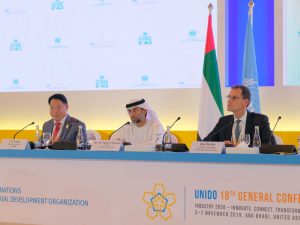Historic Abu Dhabi declaration marks a new era for global private sector alliances
The 18th Session of the United Nations Industrial Development Organisation (UNIDO) General Conference in Abu Dhabi recently drew to a close after five days of progress, developments and renewed determination towards achieving the 2030 Agenda for Sustainable Development.

Held in Abu Dhabi, the biennial event united UNIDO’s Member States, under the theme of ‘Industry 2030 – Innovate. Connect. Transform our Future’. UAE’s historic hosting marked only the fourth time the UNIDO General Conference has been held outside its headquarters in Vienna, Austria, and its first staging in the Middle East and North Africa region.
Speaking at the opening ceremony Andry Rajoelina, President of the Republic of Madagascar described the UAE as a symbol of transformation, modernisation and “one of the world’s great destinations”.
The General Conference welcomed 1700 attendees including country Presidents, Ministers of Industry, Trade, and Economy, 580 diplomats and leading officials from around the world, senior representatives of UNIDO and other United Nations organisations, and prominent private sector, civil society and academia leaders.
HE Suhail Mohamed Al Mazrouei, UAE Minister of Energy & Industry was announced President of the General Conference in the presence of Andry Rajoelina, President of Madagascar; Mahamadou Issoufou, President of the Republic of Niger and Jotham Napat Nauka, Deputy Prime Minister of Vanuatu.
Abu Dhabi Declaration
The General Conference adopted the Abu Dhabi Declaration, which calls on the private sector to form a coalition towards advancing inclusive and sustainable industrial development and achieve global prosperity.
The Abu Dhabi Declaration builds on the country’s history of leveraging public-private partnerships to develop its national economy and also exemplifies the country’s firm belief in global alliances to meet ambitious multi-region development goals. The Abu Dhabi Declaration will thus set a roadmap to create a global alliance of private sector companies that will work towards a common vision of making industrialisation more inclusive and sustainable.
The Abu Dhabi Declaration is also inspired by global industrial partnerships such as the Global Manufacturing and Industrialisation Summit (GMIS), a joint UNIDO-UAE initiative that has established over 100 partnerships with the private sector and has driven cutting-edge technological initiatives.
At a side-event entitled ‘Achieving UN SDGs through Entrepreneurship and Innovation: A Regional Perspective for African and Arab Countries’, Rashid Abdulkareem Al Baloushi, Abu Dhabi’s Acting Undersecretary of the Department of Economic Development emphasised the role of Abu Dhabi’s manufacturing sector in the Emirate’s economic development.
The Strategy for Gender Equality and the Empowerment of Women (2020-2023), an ambitious and far-reaching gender equality policy, was also launched at the UNIDO General Conference. The Strategy promotes UNIDO’s vision that women and men equally lead, participate in, and benefit from ISID.
Speaking at the Strategy launch, Ismail Abdulla, CEO of UAE-based Strata Manufacturing noted that sustainable talent acquisition is colour blind, gender-neutral and based on merit, and underlined the fact gender equality is also good business strategy, citing that the fact that more than half of Strata’s total workforce and 21 of 34 production team leaders are female.
Clean technology also fell into focus at the ‘Cleantech as a Catalyst for Climate Action and the Clean Energy Transition’ special side-event. Delivering his keynote address, Dolf Gielen, Director Innovation & Technology at International Renewable Energy Agency, IRENA IITC, called for a transition to renewable energy and a decarbonisation of power and heat supplies.
